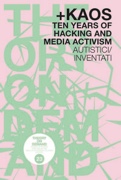English version below
Il collettivo Autistici/Inventati e l’Associazione Investici che lo rappresenta per questioni legali e burocratiche sono un gruppo di persone dedite al mantenimento e allo sviluppo di servizi di comunicazione elettronica per singoli, associazioni, gruppi informali e movimenti e hanno tra i loro obiettivi principali la difesa della libertà di espressione e della privacy.
La vicenda di cui stiamo scrivendo ha inizio tra il 9 dicembre 2008 e il 30 marzo 2009 ad Avezzano. Una querela dà vita a un’indagine, nella quale si sostiene che Gianluca Jannone, leader del gruppo neofascista “Casa Pound”, e Ercole Marchionni, fondatore di “Casa Pound Avezzano”, hanno subito atti intimidatori e diffamatori. Nello specifico vengono contestate una scritta su un muro, della vernice rossa su un campanello e alcuni scritti apparsi su abruzzo.indymedia.org e orsa.noblogs.org, nei quali si chiede di non consentire l’uso di spazi pubblici a gruppi dichiaratamente neofascisti.
In seguito alla querela si mette in moto il procuratore Stefano Gallo, insieme al Commissariato di Avezzano, e la pratica approda alla polizia postale di Milano.
Nell’agosto 2009 l’Associazione Investici (e quindi il collettivo Autistici/Inventati) viene sentita come persona informata sui fatti e dichiara di fronte a pubblici ufficiali che sui propri server non vi sono file di log relativi alla casella di posta orsa @ canaglie . net, né i dati anagrafici di chi l’ha richiesta. La Procura avvia una rogatoria internazionale (per minacce!!!) verso Norvegia, Olanda e Svizzera. Si tratta di ottenere dai provider in cui risiedono i server di Autistici/Inventati i dati che non hanno avuto dal nostro legale rappresentante, non per reticenza, ma per evidente assenza di tali informazioni.
A novembre 2010 la polizia postale norvegese procede a dar seguito alla rogatoria: si presenta negli uffici del nostro provider e pretende di copiare per intero tutti i dischi presenti sulla macchina, il cui contenuto è in gran parte cifrato. Circa due ore dopo il sequestro abbiamo riattivato i servizi su altri server. In circa 24 ore tutta la nostra infrastruttura girava esattamente come prima. In questo caso il piano R*, come meccanismo anticensura, ha funzionato discretamente.
Alcune osservazioni sui fatti
Pensiamo siano possibili diversi livelli di lettura sulla vicenda, in grado di innescare riflessioni su altrettanti aspetti della società italiana.
In primis i rapporti tra il neofascismo e le istituzioni. Recentemente si è concluso con una serie di assoluzioni il processo per la strage di Brescia. Ci sono state stagioni nella storia d’Italia in cui il neofascimo e alcuni apparati dello stato hanno avuto stretti rapporti. Storicamente ci sono diversi elementi che riconducono la strage di Brescia a gruppi neofascisti, e molto evidenti sono le coperture, i tentativi di insabbiamento, i silenzi che hanno coperto il tutto fino a oggi. A 30 anni dall’attentato è impossibile accertare qualsiasi forma di verità giudiziaria sulla vicenda. Il meccanismo di protezione innescato negli anni ‘70 ha funzionato perfettamente.
Questo tipo di atteggiamento è endemico e si ritrova anche in fatti più recenti e più piccoli, ma non meno dolorosi.
Gli assassini rei confessi di Dax sono stati condannati a pene ridicole, se paragonate ad esempio ai quattro anni per rapina inflitti a quattro antifascisti milanesi per aver sottratto un giubbotto a un naziskin.
Ci appare incomprensibile in questi giorni nei quali tutte le procure d’Italia lamentano i tagli e la scarsità di fondi, che una querela di parte recepita dal Commissariato di Avezzano per delle vicende di minima entità scateni in una Procura della Repubblica la smania di tre rogatorie internazionali per acquisire dati che non esistono o che sono privi di qualsiasi rilievo investigativo.
Riusciamo a comprenderlo solo se postuliamo che la voce di “Casa Pound” abbia una certa influenza in qualche parte delle questure italiane.
In quanto interpellati come persone informate sui fatti e quindi costretti a rispondere, abbiamo esplicitamente dichiarato di non possedere le informazioni richieste. Il sequestro successivo indica che non siamo stati creduti.
Non comprendiamo quale sia la ragione giuridica di arrecare un danno alla riservatezza di 2000 persone per avere la prova della non esistenza di dati relativi a un singolo e sconosciuto individuo. L’indagine riguarda una singola casella di posta, per la quale vengono richiesti oggi, nel novembre 2010, log relativi alla fine del 2008, che noi comunque non possedevamo neppure allora.
Alcune delle risposte si potrebbero forse trovare nel testo della rogatoria. Riportiamo la brillante traduzione inglese:
“to obtain the file of log, and IP-access, for consultation, registration, change of password and updating relative to the mailbox ORSA @ CANAGLIE . NET (SHE-BEAR @ SCOUNDREL . NET) in the time span 2008–12-09 to 2009–12-09.”
La procura ha richiesto il sequestro, ma non è in grado di comprendere che tradurre il nome utente e il dominio della mail è ridicolo, oltre che inutile. Onestamente non ci sembra un organismo adeguato a fare valutazioni tecniche rispetto a un caso correlato con le tecnologie di comunicazione informatica.
Cercando di tirare le somme: l’operazione ci appare una piccola ritorsione intimidatoria di carattere politico verso Autistici/Inventati in quanto ritenuti reticenti nel fornire un’informazione che non abbiamo, non abbiamo mai avuto e continueremo a non avere.
Una piccola ritorsione che però comporta un problema di riservatezza non indifferente per i 2000 utenti che usavano quel server. Allo stesso modo i fatti da cui scaturisce tutta l’indagine ci appaiono ingigantiti. Si parte da un minuto scontro politico, per arrivare attraverso l’uso di reati sovradimensionati a tre rogatorie internazionali.
Su queste linea ogni lite tra vicini di casa si può trasformare in un intrigo internazionale. Tutto questo non ha senso, ma in tutta questa vicenda troviamo ben poco di sensato.
***
[english version]
A/I’s Norwegian crackdown in a nutshell
The Autistici/Inventati collective and the Investici Association, which represents the collective in legal and bureaucratic matters, are a group of people who mantain and develop electronic communication services for individuals, associations, informal groups and movements and, among their particular aims, defend the freedom of expression and privacy.
The story we are going to tell started in Avezzano, Italy, between the 9th December 2008 and the 30th March 2009. A lawsuit gave rise to an investigation where it is mantained that Gianluca Jannone, leader of the neo-fascist group “Casa Pound”, and Ercole Marchionni, founder of “casa pound Avezzano”, suffered threats and slander. In particular, there are charges concerning a message painted on a wall, some red paint on a door bell and some texts published on abruzzo.indymedia.org and orsa.noblogs.org, claiming that no public space should be given to declared neo-fascist groups.
After this lawsuit, public prosecutor Stefano Gallo activated together with the Avezzano police office, and the case reached the postal police in Milan. In August 2009 the Investici Association (and therefore the Autistici/Inventati collective) was called to witness, and formally declared in front of police agents that no log files linked with the orsa @ canaglie . net mailbox were kept in its servers, nor did the association have any personal data regarding the subscriber of the mailbox.
The Avezzano police office sent a rogatory letter (with charges of threats!!!) to Norway, Holland and Switzerland, asking the local authorities to contact the providers where Autistici/Inventati keeps its servers and obtain the data that our legal representative had not given them – not with reticence, but because that information is clearly unavailable.
In November 2010 the Norwegian postal police performed their duty towards their Italian colleagues: they turned up at our provider’s webfarm and asked to copy all the disks in the server, whose contents are mostly encrypted.
About two hours after the seizure, we re-activated the services in different servers. After approximately 24 hours, our whole infrastructure was running exactly as before. In this case the R* Plan worked nicely as an anti-censorship system.
Some considerations
We think that what happened can be read at several levels, reflecting different facets of the Italian society.
First of all, the relationships between Neo-Fascism and institutions. Recently the process related to the Piazza della Loggia bombing ended with a series of acquittals. In two different phases of the Italian history, Neo-Fascism and some state organizations where closely connected. Historically, several elements link the Piazza della Loggia bombing with neo-fascist groups, and in this case there have been clear cover-ups, attempts to pigeon-hole the case, and silences which have obscured many details until today. Thirty years after that attack, it is impossible to obtain some kind of truth about what happened. The protection mechanism that was started in the 70s worked perfectly well.
This kind of attitude is endemic, and can be found in more recent incidents that may be minor but are nonetheless painful.
The men who confessed to have killed the antifascist activist Dax have been sentenced to ridiculous punishments, if compared for instance to the four-year imprisonment sentence given to four Milanese anti-fascists who had “robbed” a nazi-skin by taking his jacket.
These days, when all over Italy the police is complaining about reduced funds, we find it unexplainable that a private lawsuit filed at the Avezzano police office regarding minor events can unleash an international rogatory frenzy aimed at acquiring data that are inexistent and would be irrelevant to any investigation.
We can explain this only if we assume that “Casa Pound” has a certain influence in some sectors of the Italian police.
Since we were asked to witness and bound to answer, we have clearly declared that we did not have the requested information. The subsequent seizure means that they did not believe us.
We don’t understand what legal motivation can justify a damage to 2,000 people’s privacy just to obtain an evidence that the data regarding one unknown individual do not exist. This investigation regards a single mailbox, and what was requested in November 2010 was some logs dating back to late 2008, which we did not have even back then.
Some answers can be perhaps found in the text of the rogatory letter, and a passage from that brilliant English translation must be quoted:
“to obtain the file of log, and IP-access, for consultation, registration, change of password and updating relative to the mailbox ORSA @ CANAGLIE . NET (SHE-BEAR @ SCOUNDREL . NET) in the time span 2008–12-09 to 2009–12-09.”
The Public prosecutor’s office ordered the seizure, but did not realize that translating a user name and a mail domain is as ridiculous as it is useless. To be honest, we don’t think that this office is able to produce any technical assessments regarding an IT case.
To sum up: this action appears as a small political intimidatory retaliation against Autistici/Inventati, who have been considered reticent in denying a piece of information we have never had and never will have in the future.
But this small retaliation implies a major privacy problem for the 2,000 users who had a space in that server. Likewise, the facts that gave rise to this investigation have been seemingly overrated. Starting from an irrelevant political skirmish, overstated charges were used to send three rogatory letters abroad.
Along this line, any argument among neighbors could be turned into an international plot.
This makes no sense, but in the end, nothing makes much sense in this whole story.

